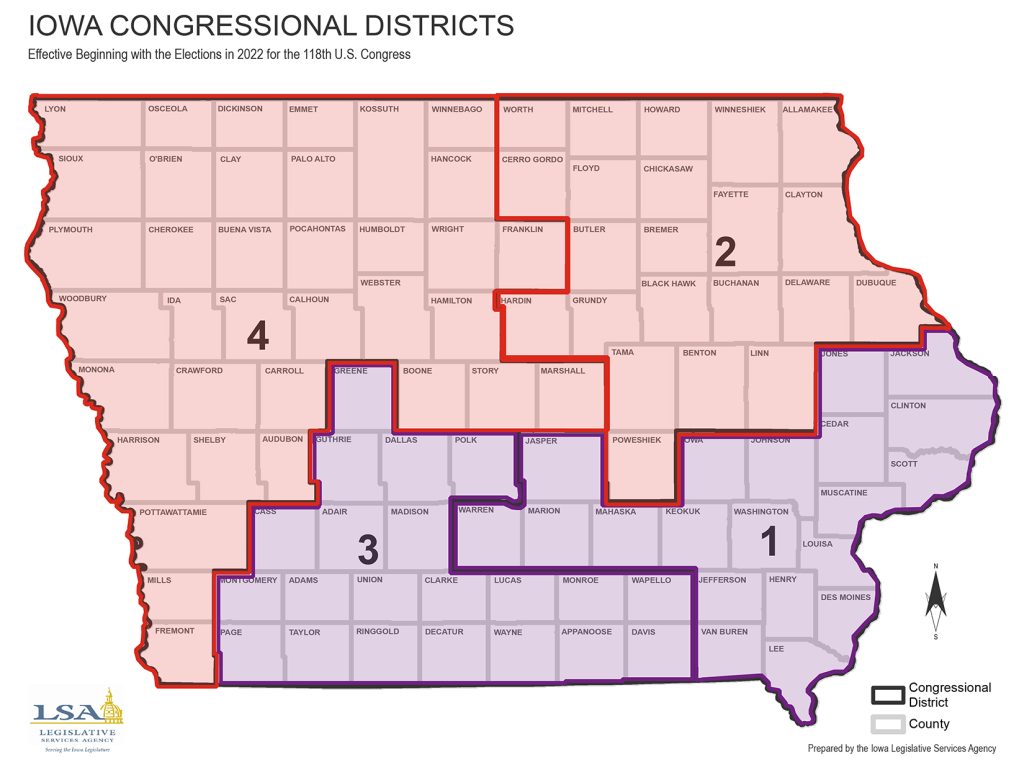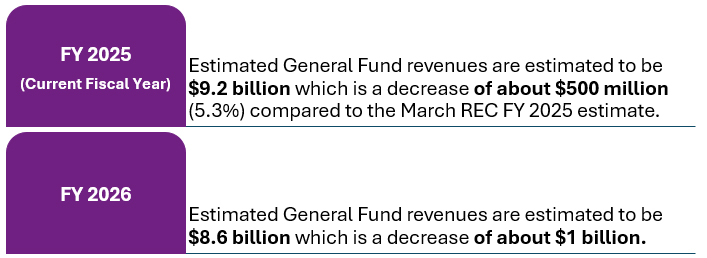Election Day 2024 is one week away. On Tuesday, November 5, voters across the United States will head to the polls to cast their ballot in local, state, and national races.
At the top of the ticket, Vice President Kamala Harris and Governor Tim Walz (D) and former President Donald Trump and Senator JD Vance (R) will face off for the Presidency and Vice Presidency. National polls indicate the race is nearly in a dead heat between the candidates from the two major political parties; the election will likely come down to the outcome in a few key battleground states: North Carolina, Pennsylvania, Nevada, Georgia, Wisconsin, Arizona, and Michigan.
Iowa Congressional Races
All 435 seats in the US House of Representatives are up for grabs in the biennial election, and Iowa is home to two of the most competitive races in the country.

In Iowa’s first congressional district, Former Iowa State Representative Christina Bohannan (D) has challenged Representative Mariannette Miller-Meeks (R) in a rematch of the 2022 midterm elections. In the last election cycle, Miller-Meeks beat Bohannan, defending the seat she won in 2020 by a total of six votes, decided after a recount, the closest Congressional race in history.
Representative Zach Nunn (R) will defend the seat in Iowa’s third congressional district—which he secured in 2022 by approximately 2,000 votes, less than a percentage point—beating incumbent Representative Cindy Axne (D) who was running for her third term in Congress. Representative Ashley Hinson (R, IA-02) and Representative Randy Feenstra (R, IA-04) are both expected to win their races and return to Washington, D.C. for another term.
Iowa Legislature Races
The 2024 election will determine the degree of the Republican stronghold in the Iowa Legislature. In the last cycle, Iowa Republicans outperformed the national Republican party’s performance at both the state and federal levels. In the Iowa Senate Republicans reached the constitutional supermajority number of 34, and the Iowa House Republicans netted four seats and retained control of the chamber by a margin of 64 to 36.
Iowa House Races
All 100 seats in the Iowa House are up for re-election. After the conclusion of the 90th General Assembly, 13 Representatives retired–four Democrats and nine Republicans—and Representative Art Staed (D, House District 80) is running for Senate District 40.

Several house races, are highly competitive, especially surrounding the Des Moines metro. In the 90th General Assembly, Republicans boasted a 28-seat majority in the House. Even so, many bills narrowly passed or were never considered by the chamber. For instance, HF 2612, the controversial Area Education Agency bill that was the main focus of the first 12 weeks of the 2024 session, only passed by eight votes. Any gains by House Democrats this November could potentially impact the Iowa House’s ability to pass legislation in instances where the Republican caucus is not aligned.
Iowa Senate Races
In the Iowa Senate, four Senators – two Democrats and two Republicans – announced their retirements, including Senate Minority Leader Pam Jochum.

All even-numbered Senate districts are up for election (25 seats) and two races in Polk County are highly competitive, reaching record-breaking levels of campaign expenditures by both parties. The most expensive legislative race in Iowa this year is Senate District 22 in Urbandale, where Sen. Brad Zaun (R) and former Urbandale City Council member Matt Blake (D) have amassed more than $1.7 million in campaign contributions and in-kind spending by outside groups since January 1, 2023.
Republicans currently have a supermajority in the Senate—the first in over 50 years—which means the majority no longer needs Democrat votes to confirm gubernatorial appointees, some of whom lead state agencies and serve on important boards and commissions. If Democrats can net at least one Senate seat, Republicans would no longer have this supermajority hold on the chamber. Nonetheless, the margin will remain significant enough for Republicans to handily move agreed upon legislative priorities.
Major changes to the statehouse chamber majorities are not anticipated on Election Day 2024, but changes in leadership and key committee chair positions are on the horizon. House and Senate caucuses will convene shortly after the election to make leadership decisions for the 91st General Assembly as well as committee chair selections and committee assignments, which will determine the landscape for the 2025 legislative session.

Ballot Measures
In Iowa, two constitutional amendments will appear on the ballot: one related to the gubernatorial line of succession and the other codifying voting age and citizen language. The former initiative clarifies the process following the resignation, death, or removal of a governor from office. Currently, legal interpretations of Article IV, Section 17 of the Iowa State Constitution differ on whether a lieutenant governor who becomes governor can appoint an individual to fill the lieutenant governorship. If passed, the state constitution would read as follows:
Lieutenant governor or lieutenant governor-elect to become or act as governor or governor-elect. If there is a temporary disability of the governor, the lieutenant governor shall act as governor until the disability is removed, or the governor dies, resigns, or is removed from office. In case of the death, resignation, or removal from office of the governor, the lieutenant governor shall become governor for the remainder of the term, which shall create a vacancy in the office of lieutenant governor. This section shall also apply, as appropriate, to the governor-elect and the lieutenant governor-elect.
This ballot measure does not affect the process for replacing former Lieutenant Governor Adam Gregg, who resigned from public service earlier this fall.
The second ballot measure repeals and replaces Article II, Section I of the Iowa State Constitution, modifying the voting age from 21 to 18 and codifying that 17-year-olds are allowed to vote in primary elections if they are 18 by the general election. Additionally, the amendment changes the wording of the current section from “every citizen of the United States” with the proper qualifications to “only a citizen of the United States” with the qualifications can vote. The full amendment reads:
Only a citizen of the United States of the age of eighteen years, who shall have been a resident of this state for such period of time as shall be provided by law and of the county in which the citizen claims the citizen’s vote for such period of time as shall be provided by law, shall be entitled to vote at all elections which are authorized by law. However, for purposes of a primary election, a United States citizen must be at least eighteen years of age as of the next general election following the primary election. The required periods of residence shall not exceed six months in this state and sixty days in the county.
Interim Update—Major Issues Impacting the Political Landscape in Iowa
Revenue Estimating Conference Projects Decline in State Revenue
The Revenue Estimating Conference met for their October meeting earlier this month, where forecasters projected revenue to decline by approximately $1 billion over the next two years. Department of Management Director Kraig Paulsen and the revenue projection panel shared that a decrease in funds was expected following tax cuts passed by the Iowa Legislature and do not account for Iowa’s $1.9 billion budget surplus.

For reference, the state brought in $9.8 billion last fiscal year and will spend about $8.9 billion on services this fiscal year. This expenditure is greater than the $8.7 billion the state is projected to take in during FY26. It is likely the shortfall may influence appropriations moving forward.
Governor Reynolds expressed the tax cuts are working as designed, while prominent Democrats conveyed concerns about the sustainability of the cuts. Even with the lower revenue numbers, Director Paulsen remains unconcerned based on the historical precedent set by the General Assembly and the $1.9 billion budget surplus, as well as the projected $3.7 billion in the taxpayer relief fund.
Major Court Rulings
Supreme Court Decides 4-3 For Six-Week Abortion Ban
After a lengthy legal battle, HF 732—also known as the “fetal heartbeat” bill—took effect on July 29, 2024, effectively banning all abortions after six weeks in the state of Iowa. HF 732 was passed in a special session of the Iowa Legislature in July 2023 after the Iowa Supreme Court issued a 3–3 decision, with Justice Oxley recusing herself and deadlocking the issue. Days following the special session, a legal challenge was filed, and the law was temporarily blocked by the district court.
The Iowa Supreme Court took up the case once again in April 2024, and the entire bench heard the case. On June 28, the Court issued a 4–3 decision and remanded the case back to the district court. Justice McDermott issued the majority opinion—joined by Justices MacDonald, May, and Oxley—stating that the district court incorrectly used the “undue burden test” and instead applied the “rational basis” analysis to determine that there is no fundamental right to abortion in the Iowa Constitution. Justices Christensen, Waterman, and Mansfield dissented.
Governor Reynolds and prominent Republican leaders in the state and around the country expressed their support of the ruling and the protection of life, while members of the Democratic party criticized the decision.
US District Court Issues Injunction Against Immigration Law SF 2340
On June 17, a US District Court issued an injunction against SF 2340, which was signed by Governor Reynolds on April 10 following passage in the Iowa House and Senate. The bill allows the state to criminally charge individuals subject to a deportation order who reside illegally in Iowa. The law was challenged by an immigrant advocacy group and the federal Department of Justice, who both claim that SF 2340 unconstitutionally regulates immigration.
The Iowa Attorney General’s Office appealed the decision, and oral arguments were held on September 26. Similar laws are enjoined in Texas and Arizona, and legal experts expect the issue of the constitutionality of state-level immigration laws to be decided by the Supreme Court of the United States.
Lieutenant Governor Adam Gregg Resigns
A major leadership change occurred in the Iowa Executive Branch after Lieutenant Governor Adam Gregg resigned from public office in early September. In a statement, Gregg expressed:
It has been a great honor to serve alongside Governor Reynolds for seven years. I have enormous respect for her and her leadership, and she will always be one of the most important mentors in my life…While difficult, the decision to resign from this role allows me to honor my most important commitment – my family.
Gregg was first appointed as acting lieutenant governor when Governor Reynolds assumed the executive office in 2017, then subsequently elected and re-elected alongside the governor in 2018 and 2022, respectively. Following his departure from office, Gregg will serve as the next president and CEO of the Iowa Bankers Association.
The Governor’s Office is in the process of vetting candidates for the Lt. Governor role, but Governor Reynolds announced she will wait until after the November election to announce a new lieutenant governor. This appointment could potentially leave a vacancy in either chamber that would require a special election and additional leadership and committee chair considerations.
What is next?
All eyes are on the battleground states counting to 270 as America elects its next President. In Iowa, what unfolds after the election is likely to have the greatest impact at the statehouse. The Dentons Davis Brown Government Relations team will be tracking results in Iowa and around the country as polls close on the fifth.
On Wednesday, November 6, Dentons clients will receive a rollup of results in Iowa and a broad overview of the national results, as available.


